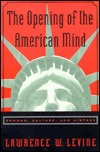
The Opening of the American Mind
By Lawrence W. Levine
My rating: 4 of 5 stars
I actually liked this book more than I thought although I am left with many questions. It was written in the mid ’90s in response to the spate of books attacking developments in the university world, Allan Bloom’s The Closing of the American Mind foremost among these and the obvious inspiration of the title. Truth is, this is a far more readable argument than Bloom’s.
Levine contends that in fact the “canon” of subjects and texts taught in the university has continued to change throughout the history of universities. At one time, the esteemed texts of English literature, philosophy, and history were in fact eschewed for Greek and Latin literature. The inauguration of “Western Civ” courses only occurred after World War 1.
Furthermore, he argues that the rise of gender, cultural, social and ethnic studies, including the impact of these studies on his own field of history is not a move to cultural relativism or political correctness. Rather, these recognize both the intellectually biased accounts of the past that marginalize many Americans who are not political leaders, or male, or white. We cannot understand the truth of our nation’s history and cultural makeup without listening to the full spectrum of those who contribute to “this American life.” So as the makeup of our country continues to change, so must the curriculum and intellectual life of the university, as it always has.
By and large, Levine’s argument has prevailed in the years since he wrote. And there is much to commend this – a fixed canon that does not take into consideration the contribution of women, the various ethnic communities, the labor movement and more to our national identity does not serve many of those who bear the title “citizen” – it merely expects them to assimilate to some “golden ideal”, when in fact, every new element to our society has changed who we are.
But there are questions Levine leaves me with:
- How does this translate into the curriculum of undergraduate education? Ever since before I was a student GEC’s were a buffet of possible course selections with little coherence except that they represented different areas of a “general education”. As important as these studies are, the reality is that students will sample only a small and fragmented portion of this. If anything, with pressures to control costs and graduate students in four years and increasing specialization of undergraduate education, there is in fact less time for such studies.
- The years since Levine wrote have resulted in an increasing polarization and Balkanization of American culture around cultural as well as political identities. Circling the wagons around a fixed canon is an inadequate defense against the increasing number of those outside the wagons. But how do we achieve a new form of e pluribus unum that recognizes both our cultural diversity and some common identity and consensus as Americans? Can we maintain an identity as a democratic republic when incommensurable worldviews clash? And what is the role of universities in helping forge that cultural consensus?
- Beyond a passing observation that, in fact, the advocates of multiculturalism have often been politically inept rather than politically correct, Levine fails to address the hyper-specialization and in-group jargon of these new areas of study that make them incomprehensible to all but the few engaged in those studies. Levine, who sadly is no longer with us, seems to be a notable exception who translates well his own studies of African American cultural history and its contribution to America’s cultural heritage. He fails to address how academics can turn from simply talking to each other to making their work accessible to a wider public in an engaging rather than belligerent manner.
These seem important questions in the ongoing formation of “the American mind” and the role of universities in that formation.
Thank-you to Bob for sharing Review: Opening of the American Mind from his blog Bob on Books (10/11/2013). This review reminds me of the importance of continuing to be in prayer for the campus and our relationship to it as a people of Uncommon Decency. May we do such to the glory of God! ~ Thomas B. Grosh IV, Associate Director, Emerging Scholars Network
Bob Trube is Associate Director of Faculty Ministry and Director of the Emerging Scholars Network. He blogs on books regularly at bobonbooks.com. He resides in Columbus, Ohio, with Marilyn and enjoys reading, gardening, choral singing, and plein air painting.

Leave a Reply